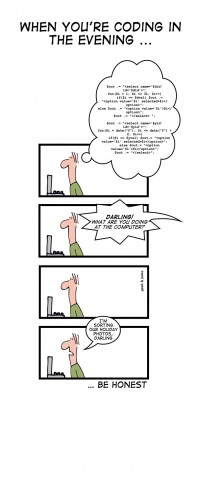In a Slashdot thread on the topic of the Programmer’s Day, I came across this insightful comment, with which, having been both a sysadmin and a programmer, I have to somewhat agree. No disrespect to any programmers intended, but sysadmins have it tougher. I wouldn’t go as far as to claim that Programmer’s Day is not deserved – we all work hard, but I agree that Sysadmin’s Day is deserved more.
Having been both a sysadmin and programmer, I have to honestly say that while sysadmin day is deserved, programming day isn’t. There’s just simply much more to sysadmins that are underappreciated when compared to programmers:
- Sysadmins setup routine systems that are built by programmers (who usually get the credit).
- Sysadmins only get (negative) attention when something goes awry.
- There’s usually no mention of sysadmins anywhere.
- Unless you are very technical, you probably don’t even know that sysadmins exist!
In contrast, programmers have it nice in the sense that when they do a good job, they are seen as the heroes who created the system. People go to programmers for feature requests in addition to bug reports. Their names are usually listed in an about dialog or readme file somewhere. Also, unless you are completely technically illiterate, you know that someone has to create the software.
The final bit: the infrastructure will crash and burn without sysadmins, but without programmers, it’ll just cease to advance.
Having a Programmer Day in addition to Sysadmin Day is like having an Executive Day in addition to Labor Day: unnecessary, unjustified. In both cases, the former already has the glory on a daily basis that the latter is hugely lacking.

